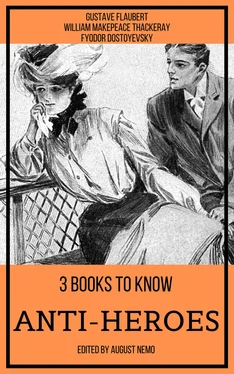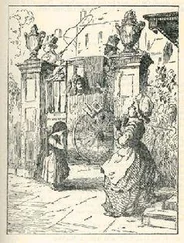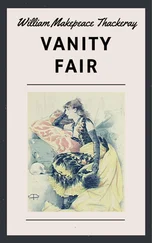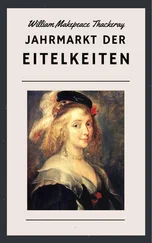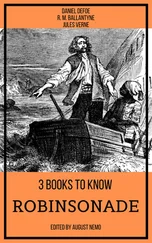We went into supper, after the two sergeants had taken charge of our horses; the Captain, also, ordering one of them to take my valise to my bedroom. I promised the worthy fellow a glass of schnapps for his pains.
A dish of fried eggs-and-bacon was ordered from a hideous old wench that came to serve us, in place of the lovely creature I had expected to see; and the Captain, laughing, said, ‘Well, our meal is a frugal one, but a soldier has many a time a worse:’ and, taking off his hat, sword-belt, and gloves, with great ceremony, he sat down to eat. I would not be behindhand with him in politeness, and put my weapon securely on the old chest of drawers where his was laid.
The hideous old woman before mentioned brought us in a pot of very sour wine, at which and at her ugliness I felt a considerable ill-humour.
‘Where’s the beauty you promised me?’ said I, as soon as the old hag had left the room.
‘Bah!’ said he, laughing, and looking hard at me: ‘it was my joke. I was tired, and did not care to go farther. There’s no prettier woman here than that. If she won’t suit your fancy, my friend, you must wait a while.’
This increased my ill-humour.
‘Upon my word, sir,’ said I sternly, ‘I think you have acted very coolly!’
‘I have acted as I think fit!’ replied the captain.
‘Sir,’ said I, ‘I’m a British officer!’
‘It’s a lie!’ roared the other, ‘you’re a DESERTER! You’re an impostor, sir; I have known you for such these three hours. I suspected you yesterday. My men heard of a man escaping from Warburg, and I thought you were the man. Your lies and folly have confirmed me. You pretend to carry despatches to a general who has been dead these ten months: you have an uncle who is an ambassador, and whose name forsooth you don’t know. Will you join and take the bounty, sir; or will you be given up?’
‘Neither!’ said I, springing at him like a tiger. But, agile as I was, he was equally on his guard. He took two pistols out of his pocket, fired one off, and said, from the other end of the table where he stood dodging me, as it were,—
‘Advance a step, and I send this bullet into your brains!’ In another minute the door was flung open, and the two sergeants entered, armed with musket and bayonet to aid their comrade.
The game was up. I flung down a knife with which I had armed myself; for the old hag on bringing in the wine had removed my sword.
‘I volunteer,’ said I.
‘That’s my good fellow. What name shall I put on my list?’
‘Write Redmond Barry of Bally Barry,’ said I haughtily; ‘a descendant of the Irish kings!’
‘I was once with the Irish brigade, Roche’s,’ said the recruiter, sneering, ‘trying if I could get any likely fellows among the few countrymen of yours that are in the brigade, and there was scarcely one of them that was not descended from the kings of Ireland.’
‘Sir,’ said I, ‘king or not, I am a gentleman, as you can see.’
‘Oh! you will find plenty more in our corps,’ answered the Captain, still in the sneering mood. ‘Give up your papers, Mr. Gentleman, and let us see who you really are.’
As my pocket-book contained some bank-notes as well as papers of Mr. Fakenham’s, I was not willing to give up my property; suspecting very rightly that it was but a scheme on the part of the Captain to get and keep it.
‘It can matter very little to you,’ said I, ‘what my private papers are: I am enlisted under the name of Redmond Barry.’
‘Give it up, sirrah!’ said the Captain, seizing his cane.
‘I will not give it up!’ answered I.
‘HOUND! do you mutiny?’ screamed he, and, at the same time, gave me a lash across the face with the cane, which had the anticipated effect of producing a struggle. I dashed forward to grapple with him, the two sergeants flung themselves on me, I was thrown to the ground and stunned again; being hit on my former wound in the head. It was bleeding severely when I came to myself, my laced coat was already torn off my back, my purse and papers gone, and my hands tied behind my back.
The great and illustrious Frederick had scores of these white slave-dealers all round the frontiers of his kingdom, debauching troops or kidnapping peasants, and hesitating at no crime to supply those brilliant regiments of his with food for powder; and I cannot help telling here, with some satisfaction, the fate which ultimately befell the atrocious scoundrel who, violating all the rights of friendship and good-fellowship, had just succeeded in entrapping me. This individual was a person of high family and known talents and courage, but who had a propensity to gambling and extravagance, and found his calling as a recruit-decoy far more profitable to him than his pay of second captain in the line. The sovereign, too, probably found his services more useful in the former capacity. His name was Monsieur de Galgenstein, and he was one of the most successful of the practisers of his rascally trade. He spoke all languages, and knew all countries, and hence had no difficulty in finding out the simple braggadocio of a young lad like me.
About 1765, however, he came to his justly merited end. He was at this time living at Kehl, opposite Strasburg, and used to take his walk upon the bridge there, and get into conversation with the French advanced sentinels; to whom he was in the habit of promising ‘mountains and marvels,’ as the French say, if they would take service in Prussia. One day there was on the bridge a superb grenadier, whom Galgenstein accosted, and to whom he promised a company, at least, if he would enlist under Frederick.
‘Ask my comrade yonder,’ said the grenadier; ‘I can do nothing without him. We were born and bred together, we are of the same company, sleep in the same room, and always go in pairs. If he will go and you will give him a captaincy, I will go too.’
‘Bring your comrade over to Kehl,’ said Galgenstein, delighted. ‘I will give you the best of dinners, and can promise to satisfy both of you.’
‘Had you not better speak to him on the bridge?’ said the grenadier. ‘I dare not leave my post; but you have but to pass, and talk over the matter.’
Galgenstein, after a little parley, passed the sentinel; but presently a panic took him, and he retraced his steps. But the grenadier brought his bayonet to the Prussian’s breast and bade him stand: that he was his prisoner.
The Prussian, however, seeing his danger, made a bound across the bridge and into the Rhine; whither, flinging aside his musket, the intrepid sentry followed him. The Frenchman was the better swimmer of the two, seized upon the recruiter, and bore him to the Strasburg side of the stream, where he gave him up.
‘You deserve to be shot,’ said the general to him, ‘for abandoning your post and arms; but you merit reward for an act of courage and daring. The King prefers to reward you,’ and the man received money and promotion.
As for Galgenstein, he declared his quality as a nobleman and a captain
in the Prussian service, and applications were made to Berlin to know if
his representations were true. But the King, though he employed men of
this stamp (officers to seduce the subjects of his allies) could not
acknowledge his own shame. Letters were written back from Berlin to
say that such a family existed in the kingdom, but that the person
representing himself to belong to it must be an impostor, for
every officer of the name was at his regiment and his post. It was
Galgenstein’s death-warrant, and he was hanged as a spy in Strasburg.
‘Turn him into the cart with the rest,’ said he, as soon as I awoke
from my trance.
CHAPTER VI. THE CRIMP WAGGON—MILITARY EPISODES
Читать дальше
